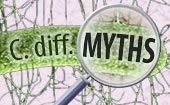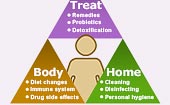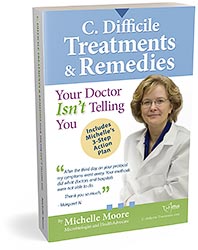Doctors mean well and are doing the best job they can. And for serious infections, being under the care of a good doctor is critical, regardless of what treatments you choose to use.
But there are 5 critical things your doctor probably won’t tell you about antibiotics, your healthcare and your C. difficile treatment options…
1. You’re getting the standard protocol treatments, NOT what’s best for you
 Doctors are forced by insurance companies to cut costs by prescribing generic “one-size-fits-all” treatments whenever possible. If you have the general symptoms of an infection, it’s easy for your doctor to give you a broad-spectrum antibiotic. Antibiotic drugs are often prescribed needlessly, “just to be safe”, even if there are no symptoms of an infection. These powerful drugs are commonly prescribed for colds and viral infections, for which they are useless.
Doctors are forced by insurance companies to cut costs by prescribing generic “one-size-fits-all” treatments whenever possible. If you have the general symptoms of an infection, it’s easy for your doctor to give you a broad-spectrum antibiotic. Antibiotic drugs are often prescribed needlessly, “just to be safe”, even if there are no symptoms of an infection. These powerful drugs are commonly prescribed for colds and viral infections, for which they are useless.
Many of the symptoms of C. difficile are identical to the side effects of antibiotic drugs. And general physicians can be inexperienced with C. difficile diagnosis and treatment. Therefore, misdiagnosis and delays in getting proper treatment are common. An because most antibiotics can make C. difficile grow worse, you need to be very careful about the use of antibiotics if you have a C. diff. infection.
Also be aware that most doctors don’t know the first thing about natural medicine because they are never taught about it in medical school. In fact, most M.D. will discourage the use of natural medicine, even if they know nothing about it.
You need to know the pitfalls of the healthcare system and learn how to avoid time-wasting (and expensive) mistakes. You should also know what questions to ask your doctor to get the best medical care for C. difficile and ensure that you are getting the right treatments.
2. Your infection can easily come back again later
 Recurring infections happen to nearly 25% of people who have C. difficile. Unfortunately, the medical system does not set you up for success when it comes to addressing recurring infections.
Recurring infections happen to nearly 25% of people who have C. difficile. Unfortunately, the medical system does not set you up for success when it comes to addressing recurring infections.
It’s no wonder recurring infections are so common. The same drugs used for C. difficile treatment can beat down your body’s immune system and natural defenses, leaving the door wide open for future infections.
If you want to stop the cycle of recurring infection, you need to understand the underlying causes of your infection and how to strengthen your body’s natural defenses.
3. Antibiotics are risky drugs with negative side effects
 If you choose to take antibiotics, you need to know the truth about how dangerous they can be, especially if you have a history of C. difficile. The risks of taking some antibiotics (especially clindamycin, sulfonamides and fluoroquinolones) are greater than you may realize. Antibiotics cause nearly 20% of all emergency room visits due to drug reactions. If you take antibiotics, you need to learn techniques to counteract the negative side effects of these powerful drugs.
If you choose to take antibiotics, you need to know the truth about how dangerous they can be, especially if you have a history of C. difficile. The risks of taking some antibiotics (especially clindamycin, sulfonamides and fluoroquinolones) are greater than you may realize. Antibiotics cause nearly 20% of all emergency room visits due to drug reactions. If you take antibiotics, you need to learn techniques to counteract the negative side effects of these powerful drugs.
Antibiotics weaken your immune system and upset the balance of “good” bacteria in your gut, putting you at risk of C. difficile infection. Antibiotics can often lead to secondary yeast, viral and bacterial infections. If you use antibiotics, you better learn how to rebuild your immune system to keep your infection from coming back.
Antibiotics can cause stealth bacteria to grow in your body. Many antibiotics, including Vancomycin, may cause C. difficile to mutate into L-form “stealth bacteria”. L-forms can hide inside your body for years, waiting for the right opportunity to cause re-infections later. There are techniques you can use to reduce this little-known risk.
4. Washing your hands and other cleaning methods may be doing you more harm than good in the long run

Washing your hands with soap and water will help remove C diff bacteria
It’s also important to know that popular hand sanitizers that contain alcohol will not kill C. difficile spores. And no matter how good you wash your hands, hand washing alone will not protect you from other routes of exposure. You need to learn how to control C. diff. bacteria and keep your home clean using methods that are both effective and safe.
5. Foods you’re eating right now are making your infection grow worse
Eating certain foods like sugar and highly processed foods and grains encourage the growth of pathogenic microorganisms like C. difficile. But some foods, herbs and other natural products not only fight infection, they also boost your body’s natural defenses. If you want to get rid of C. difficile for good, you need to avoid harmful foods and discover which foods can help you ward off future infections.
Become informed or become another statistic of the healthcare system
Here’s the good news: YOU CAN learn how to strengthen your immune system and begin using specific techniques to counteract the harmful side effects of your antibiotics.
Here’s even better news: Alternatives to antibiotics are available so you can stop infections with virtually no negative side effects as compared to antibiotics. And these alternative methods have a proven track record of safety and effectiveness against GI infections like C. difficile.
Find out more
I cover more details about C diff and supplements that have helped others recover. Be sure to get my “10 Things” free report to find out the details, including my favorite supplement programs. You’ll find this report on the left sidebar.
You can also find out more in my new book “C. Difficile Treatments and Remedies Your Doctor Isn’t Telling You”. Click here for more.

About the Author – Michelle Moore, BSc
Michelle Moore is a microbiologist, holistic health educator, and author of C. difficile Treatments & Remedies. With over 10 years of experience in pharmaceutical research and over 20 years in natural medicine, she helps people overcome C. difficile and other chronic infections naturally.
Image credits: Doctor: ©Yuri/iStockPhoto; Myths: ©CDC; 3 Steps: ©Lester Moore; Stethoscope: ©bluestocking/iStockPhoto, Hands: fotolia.com ©Subbotina Anna





 Fill in the form below to get our C. diff. tips newsletter and your free report “10 Things You Need to Know to Overcome C. difficile”.
We value your Privacy. Your email will be kept strictly confidential & secured. See our
Fill in the form below to get our C. diff. tips newsletter and your free report “10 Things You Need to Know to Overcome C. difficile”.
We value your Privacy. Your email will be kept strictly confidential & secured. See our 
